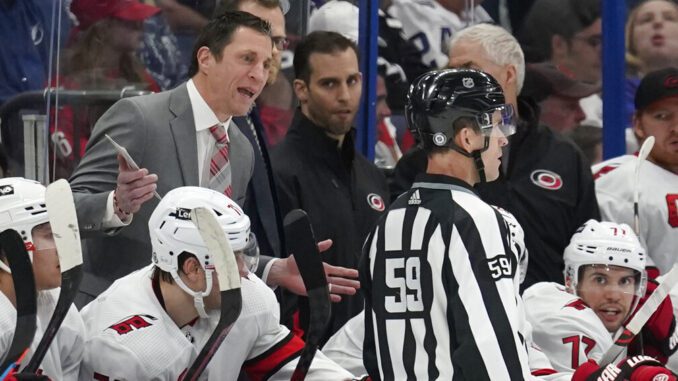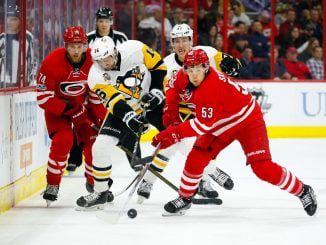
RALEIGH — Yes, Rod Brind’Amour saw the article by TSN’s Travis Yost that detailed the irregularities in penalties called on the Colorado Avalanche, Arizona Coyotes and his Carolina Hurricanes.
No, the coach doesn’t think there’s some vast conspiracy against his team.
“I 100% know the integrity is not in question,” Brind’Amour said following Friday’s practice. “(The refs), I talk to them all the time after, and this is not about, ‘Oh, I’m picking on you guys.’ No. It’s worked this way, it’ll work its way the other way.”
That doesn’t mean there isn’t frustration for a team that leads the league in both shorthanded ice time (404:46) and times shorthanded (234) through Friday night’s games.
“I think we own the penalties we take,” Brind’Amour said. “I don’t ever really complain too much about the amount of penalties we take. I don’t like taking that many, but it’s very rare I say, ‘That was a bad call.’
“I think the issue has always been we see it on the other hand. When that article came out, that kind of blew my mind.”
The article pointed out that the differential between the Avalanche and the Hurricanes — who have been among the NHL’s best teams in both goal differential and possession in recent years — is nearly one penalty per game favoring Colorado over the past three seasons. Meanwhile, the bottom-of-the-barrel Coyotes hovered right in the middle.
That differential isn’t obvious on a game-to-game basis but rather is built slowly — a call against here, one not called there.
An example was Tuesday in Tampa Bay when Carolina defenseman Tony DeAngelo was called for cross-checking just over five minutes into the game and was later cross-checked similarly without a call against the Lightning.
Then in overtime of that game, Jordan Staal was called for holding — a penalty that led to Steven Stamkos’ winning goal at 4-on-3.
I mentioned to Brind’Amour after that game that the Staal call seemed weak given that similar plays — Jaccob Slavin being turned around with a hold while carrying the puck in the Carolina end stood out — hadn’t been called in the third period.
In the moment, he seemed to be too frustrated to say anything other than,” “What’s the question? Do I just agree with you? Agreed. Good observation. Tough.”
On Friday, he mentioned that call specifically when trying to explain his perspective on how he views the situation.
“We’re not talking about our penalties,” Brind’Amour said. “Jordan Staal’s penalty is a penalty in overtime. I would have wanted it the other way. Now, it’s marginal. But if it was my guy …
“That’s not what the issue is. The issue is, go back to all the other ones. … And that was that article kind of brought to light.”
The results of the article’s analysis raised eyebrows, including Brind’Amour’s.
But the coach was crystal clear that he doesn’t think the penalty differential is anything other than an anomaly.
“I think it will even itself out,” he said. “If I go back to seven years previous, when we weren’t very good … we always had more power plays than kills. And now it just switched the other way. … I think if we revisit this in three more years and it will probably be even.”
Brind’Amour said that the penalty differential doesn’t seem like much when you have the one-day-at-a-time mindset he employs. Anyone who is around the coach enough knows he’s not one to look at quirky statistical trends to find meaning. He’s not even that interested in talking about winning streaks and losing streaks — it’s always about the next game.
That doesn’t make talking down his players after they feel the calls are going against them any easier.
“The hard part,” he said, “is I don’t have an answer. … ‘If you’re gonna call me for it, when it happens to me I should get a call for it.’ And that’s where the frustration goes on the player’s side of it. I think it’s all going to even itself out, that’s what I think.”
Viewers around the league, even Hurricanes observers and fans, have noticed that some Carolina players are prone to unnecessary penalties. Andrei Svechnikov was particularly guilty of stick infractions and frustration penalties in his first few seasons.
Brind’Amour said he’s improved.
“He was his own worst enemy,” Brind’Amour said of Svechnikov and his penalty troubles. “And now he’s gotten better. He’s a guy that gets frustrated because he gets called for everything, and then when it happens against him a lot … but I think it will even out.”
Svechnikov showed his improved discipline Thursday against the Canadiens when he and David Savard exchanged checks, followed by Savard cross-checking Svechnikov in front of the Montreal net even well after Svechnikov had scored.
“He gave me one cross-check, and I wanted to give it so bad, give it to him back,” Svechnikov said Friday. “But I heard the noise (because of the goal) and I’m like, ‘OK, I gotta stay calm.’”
Brind’Amour knows the aggressive manner with which his team plays will lead to penalties — and every team is going to get their share no matter what — and he can live with that.
“Three or four a night,” he said. “I’d like to take two or take none. But I can’t gripe about the ones that are called.”
So what is he looking for?
“We all just want a fair fight. These guys deserve it.”



